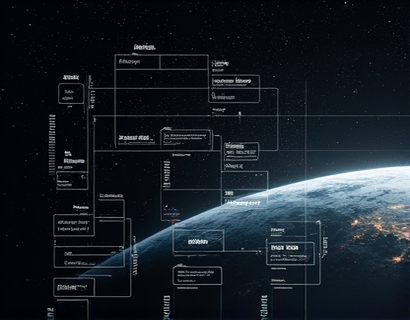Decentralized DAO Management: Elevate Governance with Advanced Analytics and Collaboration Tools
In the rapidly evolving landscape of decentralized finance and autonomous organizations, the role of governance has become increasingly critical. Decentralized Autonomous Organizations (DAOs) represent a novel approach to governance, leveraging blockchain technology to create transparent, community-driven entities. However, effective governance in DAOs requires more than just decentralization; it demands sophisticated tools and strategies to manage complex operations and ensure sustainable growth. This article delves into how advanced software solutions can transform DAO governance by integrating advanced analytics and collaboration tools, thereby enhancing decision-making and fostering a more engaged community.
Understanding DAO Governance Challenges
DAOs operate on a unique model where decisions are made collectively by token holders, often through on-chain voting mechanisms. While this approach promotes inclusivity and transparency, it also introduces significant governance challenges. Managing a DAO involves coordinating diverse stakeholders, ensuring compliance with legal and regulatory requirements, and maintaining the security and integrity of the organization. Traditional governance methods can be cumbersome and inefficient, leading to delays and misalignments in decision-making processes.
One of the primary challenges is the lack of real-time data and insights. Without comprehensive analytics, administrators struggle to assess the health and performance of the DAO. This can result in suboptimal decisions based on incomplete or outdated information. Additionally, the decentralized nature of DAOs makes collaboration and communication among members difficult, often leading to fragmented efforts and duplicated work. These issues can hinder the DAO's ability to adapt and thrive in a dynamic environment.
Advanced Analytics for Informed Decision-Making
To address these challenges, integrating advanced analytics into DAO management is essential. Advanced analytics tools provide real-time data and comprehensive insights, enabling administrators to make data-driven decisions. These tools can track various metrics such as token distribution, voting patterns, and community engagement, offering a holistic view of the DAO's operations.
For instance, by analyzing token distribution, administrators can identify potential concentration risks and take proactive measures to maintain a balanced ownership structure. Voting pattern analysis helps in understanding community preferences and predicting outcomes of proposed changes, allowing for more strategic planning. Community engagement metrics provide insights into member participation and satisfaction, guiding initiatives to boost involvement and loyalty.
Moreover, predictive analytics can forecast future trends and potential issues, enabling preemptive actions. For example, by analyzing historical voting data and external factors like market conditions, administrators can anticipate potential conflicts or opportunities and prepare accordingly. This proactive approach not only enhances governance efficiency but also builds trust among community members by demonstrating a commitment to transparency and foresight.
Enhancing Collaboration Through Advanced Tools
Collaboration is the lifeblood of any successful DAO. Advanced collaboration tools can significantly improve the way members work together, ensuring that efforts are coordinated and goals are aligned. These tools facilitate seamless communication, streamline workflows, and foster a sense of community and shared purpose.
One key feature of advanced collaboration tools is their ability to centralize information and resources. A centralized dashboard can serve as a one-stop hub for all DAO-related activities, including proposal tracking, voting results, and community announcements. This centralization reduces the risk of information silos and ensures that all members have access to the latest updates and relevant data.
Task management features allow administrators to assign and track responsibilities, ensuring that projects progress smoothly and deadlines are met. Members can view their tasks, submit updates, and collaborate in real-time, fostering a culture of accountability and productivity. Integration with popular communication platforms like Slack or Discord can further enhance collaboration by allowing for seamless transitions between different tools.
Another critical aspect is the facilitation of transparent and inclusive decision-making processes. Advanced tools can implement features such as proposal tracking, where suggestions can be submitted, discussed, and voted on in a structured manner. This process ensures that all voices are heard and that decisions are made democratically. Real-time voting and feedback mechanisms can also be integrated, allowing for immediate aggregation and analysis of community input.
Building a Culture of Transparency and Trust
Transparency is a cornerstone of successful DAO governance. Advanced analytics and collaboration tools play a pivotal role in fostering an environment of openness and trust. By providing real-time access to data and facilitating open communication, these tools help build a culture where members feel informed and empowered.
Transparency in financial management is particularly crucial. Advanced analytics can offer detailed insights into the DAO's financial health, including revenue streams, expenses, and fund allocation. This level of transparency helps prevent mismanagement and builds confidence among token holders. Automated reporting and alerts can notify members of key financial events, ensuring that everyone stays informed and engaged.
Moreover, transparency extends to the governance process itself. By documenting and making all discussions, proposals, and voting results publicly accessible, DAOs can demonstrate their commitment to openness. Advanced tools can automate the recording and archiving of these activities, reducing the risk of manipulation and ensuring that the historical record is accurate and tamper-proof.
Driving Sustainable Growth Through Data-Driven Strategies
Ultimately, the goal of advanced DAO management tools is to drive sustainable growth and long-term success. By leveraging advanced analytics and collaboration features, administrators can develop strategies that are grounded in data and community input. This approach not only enhances governance efficiency but also fosters innovation and resilience.
Data-driven strategies enable DAOs to identify and capitalize on emerging opportunities. For example, by analyzing market trends and community interests, administrators can pivot towards promising areas, such as new projects or partnerships. This agility is crucial in a rapidly changing landscape where adaptability can mean the difference between success and obsolescence.
Additionally, fostering a collaborative and transparent culture attracts and retains talented members and partners. When individuals feel valued and heard, they are more likely to contribute their best efforts and bring new ideas to the table. This collective intelligence and creativity are invaluable assets for any DAO aiming to thrive in the long term.
In conclusion, the integration of advanced analytics and collaboration tools represents a transformative step in DAO governance. These technologies address key challenges, enhance decision-making, and build a foundation of trust and transparency. By embracing these tools, DAOs can unlock their full potential, drive sustainable growth, and become truly decentralized and community-driven entities.










































